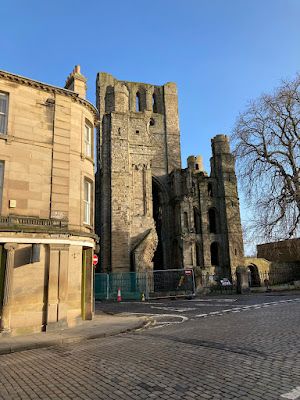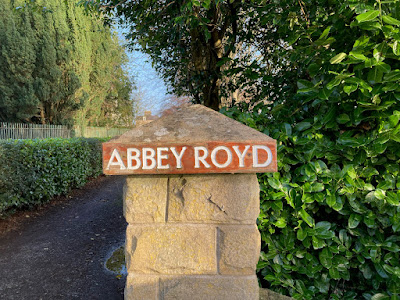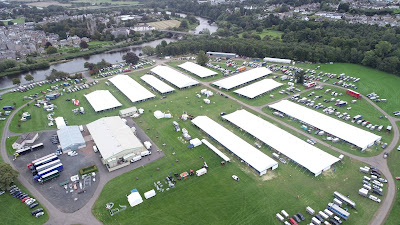Since Saturday (New Year's Day) was bright and not too cold, and as I had no possibility of a hangover, I went for a drive to the town of Kelso, in the Scottish Borders. The place is around 50 miles from here, but it's a town I haven't visited for years, and I always liked it.
The Borders region has some very attractive towns, and I used to visit there quite often; my first wife's family came from St Boswell's and from Coldstream. It's a sparsely populated area, very agricultural, but there is a lot of history around those parts. Most of the towns are on the main modern routes into England - the A68 (to Jedburgh and Carter Bar), the A7 (to Hawick and Carlisle) or the A1 (to Berwick and Newcastle), but, although it always had an important strategic position on the mighty River Tweed, people don't normally visit Kelso unless they are going to - erm - Kelso.
My first father-in-law took me to see the sheep sales there, on a Saturday morning long ago, and subsequently I was a guest at various family functions in the town over the years, mostly at the Ednam House hotel (I think there were family connections!).
One effect of the pandemic has been that I have become even more of a recluse than I was before, and I've been nurturing an unreasonable urge to visit some of these old Borders haunts, if only to prove that they still exist!
On Saturday, then, I made a brief but enjoyable visit to Kelso, which was once the county town of Roxburghshire, by the way. Not much traffic, and I didn't get breathalyzed once (I was quite looking forward to it...). I took only a few photos, since the visit itself was the main objective, but I thought they might have some appeal in my blog. When we can travel about again, I recommend the Scottish Border country as a place worth a visit. From Kelso it's only a few miles to Melrose, site of another great abbey and also Sir Walter Scott's military collection at Abbotsford...
***** Late Edit *****
Since I was asked about the matter, I did some reading and now realise that the Kelso Ram Sales are still going strong - here's an aerial shot of a recent one [used without permission, of course]. The Events Centre is on the other side of the river from the town - you can see the bridge and the Abbey in the background, and you can see a few modern suburbs in the right backround, south of the Tweed. Maxwellheugh has an industrial park - my first wife's family owned the sawmill in Spylaw Road, south of the river - long gone.
*********************






Looks nice, and peaceful. The borders are sadly overlooked by us sassenachs, I'm afraid.
ReplyDeleteWe rashly went to Southwold the same day - it was rammed!
Kelso does get a bit busy when the horse racing is on, but it's relatively quiet most of the time. That is the quietest I've ever seen it, though!
DeleteMy mother was in hospital as a child in West Yorkshire ay Mytholmroyd. Apparently a Royd is a man made clearing in woods often enclosed within a hedge. Not uncommon in West Yorkshire place names. Royd is derived from the Anglo-Saxon "Rod". Ain't Google great!
ReplyDeleteExcellent - thanks for this. They were all good solid Anglo-Saxon speakers in the Borders too!
DeleteAnd there’s me, like a right divvy, thinking ROYD was a misprint. 😄
ReplyDeleteMaybe it is - never heard it before. I used to have a workmate named Boothroyd - I now realise that was the place his people came from.
DeleteI haven’t been to Kelso in ages…
ReplyDeleteNext time you should take a visit to Smailhome Tower…
It’s a bit of a hike… but the view is incredible…
All the best. Aly
Good idea Aly. I was a bit short of time on Saturday, but I'll go again when the sun is higher in the sky.
DeleteYes, lovely those border towns, great atmosphere, though you seem to have visited the day after the apocalypse. Can't you still see the musket ball holes in Kelso Abbey from a little unpleasantness during the Rough Wooing in the 1540's? Or was that Jedburgh? Possibly both.
ReplyDeleteAnd yes, royd, Old English for a woodland clearing.
Apparently the Abbey was a big, rambling place - the bit that is left is described on the website as just being "a fragment of the church". Certainly well bashed up. The brief history bit on the website includes a quote that in 1545 the place was ‘all put to royen, howsses and towres and styples’, and for a brief, daft moment I wondered if royen was another Anglo-Saxon word, but realise it is just an old spelling of "ruin", though I wonder how they pronounced it?
DeleteI don't think accurate spelling was highly prized in the 16th and 17th centuries. So long as it was close enough, it was good enough. Can you imagine a 16th century border accent? No, neither can I.
DeleteI remember seeing somewhere the Earl of Angus (another Douglas!) spelt Anguissh. Possibly a Freudian slip.
I spent some time reading the life of Alexander Leslie (CS Terry?), which includes a lot of his correspondence, and also the justificatory pieces by William Baillie - in both of these, I was fascinated to realise that the way they spelled certain words makes it clear that they pronounced them in a Scottish way - I'd have to do some revision to find examples - it was probably more usage than individual words. As for 16th Century Borders accents, whatever they said, they probably took their time to say it!
DeleteYes, I love that - the passages you have to read with a Scots accent to understand what they are saying!
DeleteI’ve been listening to this chaps Podcast…
DeleteHe gives some very good background into the development of English as a spoken and written language…
https://podcasts.apple.com/gb/podcast/the-history-of-english-podcast/id538608536
He also make a convincing crack at speaking in the different historical dialects…
He has produced and audio book on the alphabet…
https://music.apple.com/gb/album/the-history-of-the-alphabet/610243788
The podcast and the book get quite deep and makes my brain hurt from time to time… but I think I am starting to get the hang of it.
Aly - thanks for this - very late in life i have come to realise that the history of language, and the usage thereof, is one of the things which interest me most. Part of this is the celebration of the fact that local accents and dialects, far from being a source of shame, a hallmark of social class and something to be eradicated, are a very rich heritage indeed, and essential for the understanding of who we are and how we got here.
DeleteI shall check this out, definitely.
If you want to go deep he also has an audiobook called Beowulf deconstructed…
DeleteLooks lovely... we always speed through the borders together to Glasgow when we're heading back home for a visit. Definitely somewhere I ought to spend a bit more time in!
ReplyDeleteI guess Kelso is a bit out of the way if you're belting up the M74, but you do have Dumfries & Galloway handy on the way up, and there's Moffat, and how far is St Mary's Loch and the Grey Mare's Tail? And what about Peebles...?
DeleteIt does look a nice place to visit.
ReplyDeleteVery nice Ray - when the war is over, we'll meet there for a beer!
DeleteI am in the Sam boat as Alastair, although I have been in NZ 33 years so haven't had a lot of opportunity to see the Borders recently! Our family occasionally stopped somewhere like Kelso or Galashiels but generally just passed through the Borders without stopping. On one trip home, my wife and I did stop in some tiny Border village for lunch at the pub...somewhere, I have a photo of her on the business side of the bar...I am pretty sure we were there about an hour and were the only customers!
ReplyDeleteBest restaurant in a small village in the Borders that I know of is probably the Wheatsheaf, at Swinton, near Duns, but there are a good few in normal times!
DeleteA very enjoyable backroads diversion, Tony!
ReplyDeleteThese places are getting fewer and further between in the UK nowadays, but it's great to stand in a quiet town and enjoy it for what it is. I live in a very rural area, and I listen to the morning reports on the radio about traffic hold-ups on the M25 (London circular expressway) while I'm watching the birds in the forest. Different planet - mind you, in London they get decent broadband and the electricity poles don't blow down too often...
DeleteDespite it being closed it looks like a very nice place to visit. The Border regions are under rated and it’s certainly my intention to visit the area more often.
ReplyDeleteThe sheep market reminds me of my early days as a young PC Guisborough market town had a Cattle Mart on a Tuesday - always well attended as the licensing hours ( remember those) were suspended and the pubs were open 10am - 11pm and there were a lot of pubs in the town in those days, by early tea time all manner of fun and games ( usually involving fists!) started to take place. Alas the Mart as well as many of the pubs have long gone
Hi Graham - thing about the Borders, as a couple of the guys have mentioned, is that people mostly pass through them on the way to somewhere else. Definitely worth some time - Melrose is a fine place too.
DeletePunch-ups at the Cattle Mart - great stuff - sounds like the Wild West!